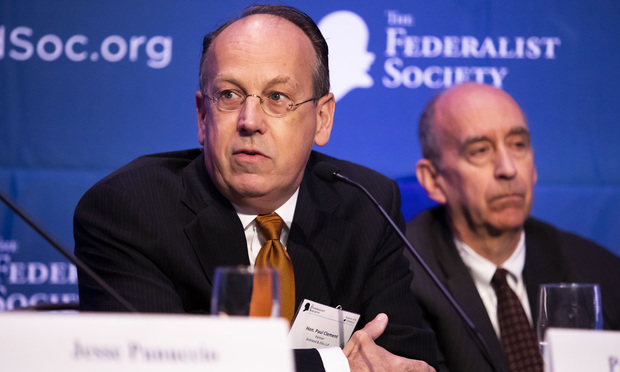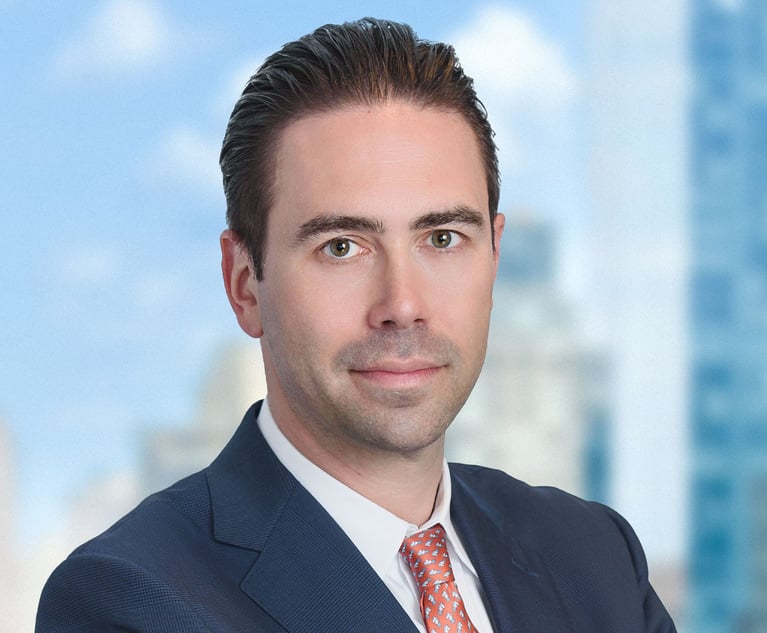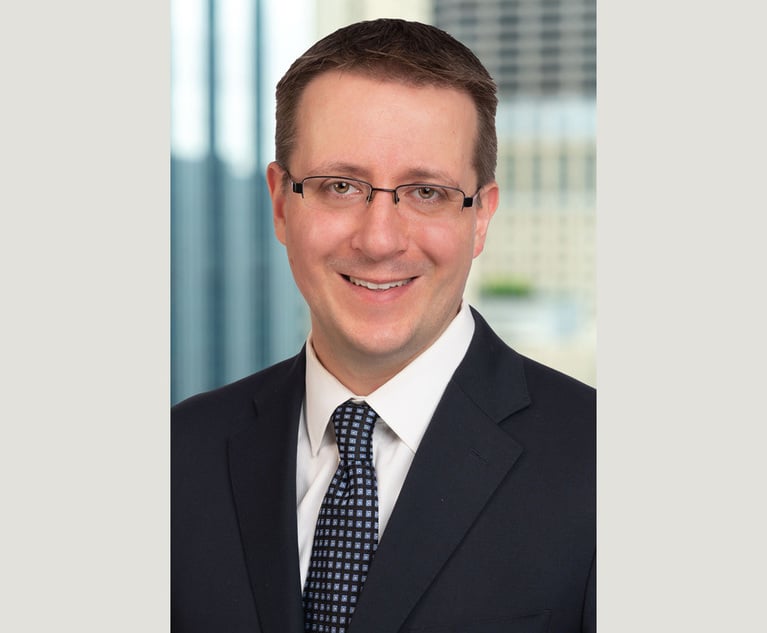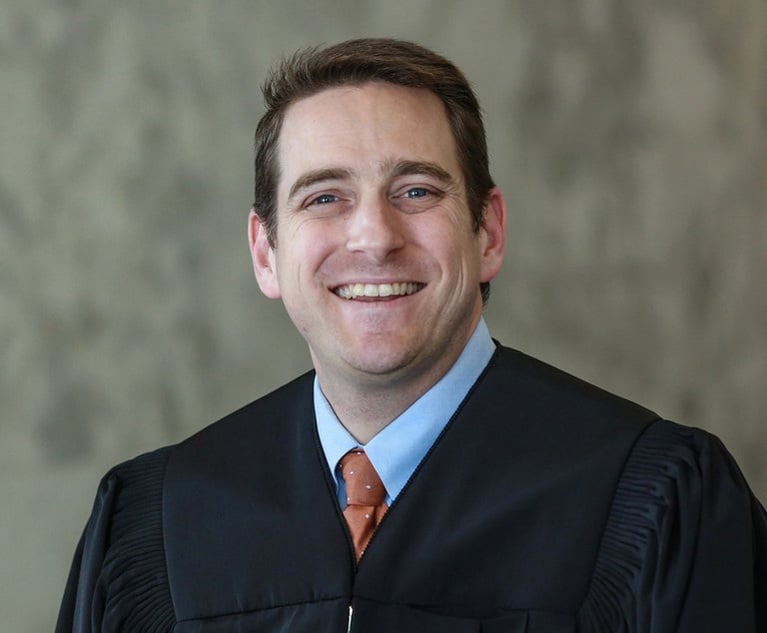In Coronavirus Shadow, Supreme Court Will Review Class Actions, Arbitration, Job Bias and More
Kirkland's Paul Clement has four petitions on the justices' Friday conference list. Meanwhile, the court, responding to the COVID-19 crisis, is extending deadlines to file new petitions.
March 19, 2020 at 02:34 PM
5 minute read
The original version of this story was published on National Law Journal
 Paul Clement speaking at the Federalist Society's 7th annual Executive Branch Review Conference on May 8, 2019. Credit: Diego M. Radzinschi / ALM
Paul Clement speaking at the Federalist Society's 7th annual Executive Branch Review Conference on May 8, 2019. Credit: Diego M. Radzinschi / ALM
A child-welfare class action, a football arbitration challenge, state immigration "sanctuary" laws, job discrimination charges and religious advertising are some of the petitions awaiting the U.S. Supreme Court on Friday as it carries on its business in the coronavirus era.
The Supreme Court's iconic building in Washington, across from the U.S. Capitol, may be closed and March arguments temporarily suspended but the justices will engage in one of their easier logistical tasks—discussing pending petitions seeking the magic four votes for review next term.
The court, citing the coronavirus pandemic, said earlier that justices could participate by phone, rather than meeting in a conference room at the court. On Friday or Monday, the court could issue an "orders" list detailing the fate of the pending petitions, and there is also the possibility of opinions in the many cases that were argued in recent months.
The justices' pace of issuing opinions has been slow, much slower than the previous term that began in October 2018. One reason could be the extra duties taken on by Chief Justice John Roberts Jr. during the Trump impeachment proceedings, as well as the general difficulty and potential divisiveness of a number of the cases. The court has heard 43 argued cases since its October term opened and has issued 14 decisions, including three unsigned opinions.
In response to the impact of the ongoing health crisis, the justices on Thursday issued an order extending filing deadlines for certain petitions due on or after the order's date—an additional 150 days. Motions for extensions of time will be routinely granted, the court said, if the grounds relate to the virus and the request is reasonable. The justices also said they will entertain motions to delay distributing petitions where the virus has caused difficulties for lawyers who must file reply briefs.
On the schedule for Friday's private conference are four petitions filed by former George W. Bush solicitor general Paul Clement, partner at Kirkland & Ellis. In the case Faust v. B.K. by her next friend Margaret Tinsley, Clement, representing the director of the Arizona Department of Child Safety, challenges certification of a class of children in the state foster care system who claim they are at serious risk of emotional and physical harm.
"This sprawling class action should never have been certified," Clement argued in the petition. "The Ninth Circuit, however, employs an approach to class actions seeking systemwide reform that makes certification all but automatic: Allege various disparate injuries to inmates or foster children, seek an injunction to make the system 'do better' by those in its custody or care, and certification of a (b)(2) class follows as a matter of course."
Perkins Coie partner Joel Nomkin counters that "the court found that issues such as whether the State exposes class members to an unconstitutional risk of harm by seriously overburden-ing caseworkers, or by providing an insufficient array of housing and mental-health services, can be answered in 'one stroke,' as required to establish commonality under Rule 23(a)."
Clement is also asking the justices to review a D.C. Circuit decision in the case Archdiocese of Washington v. Washington Metropolitan Transit Authority.
The appeals court upheld the transit agency's policy barring ads that promote or oppose religion or a religious perspective. Former Obama solicitor general Donald Verrilli Jr., a partner at Munger, Tolles & Olson, is counsel to WMTA. The case has lingered on the docket for some time. Justice Brett Kavanaugh's likely recusal—he participated in the case while on the D.C. Circuit—and the potential for a 4-4 decision may complicate the decision whether to grant review.
Clement's third scheduled petition is the case John Doe 1 v. Federal Election Commission, a First Amendment challenge to the FEC's disclosure of investigatory files and the identities of those investigated pursuant to its general rulemaking authority. Clement is also counsel of record in Rams Football v. St. Louis Regional Convention, a Federal Arbitration Act challenge involving questions of arbitrability. His opponent is James Bennett of Bowd Bennett in St. Louis.
Other petitions that the justices will examine either for the first time or again include:
>> In the case United States v. California, the Trump administration contends that federal law or intergovernmental immunity preempts certain provisions in California law that prohibit state law-enforcement officials from providing federal immigration authorities with release dates and other information about individuals subject to federal immigration enforcement, and restrict the transfer of aliens in state custody to federal immigration custody. Aimee Feinberg, the California deputy solicitor general, represents the state.
>> VF Jeanswear is challenging the authority of the U.S. Equal Employment Opportunity Commission to continue investigating a charge of discrimination after the agency issues the charging party a right-to-sue notice and after the charging party pursues private litigation. James Powell of Womble Bond Dickinson in Greensboro, North Carolina, represents VF Jeanswear. U.S. Solicitor General Noel Francisco is counsel to the EEOC.
Below: Read the court's guidance about deadline extensions
This content has been archived. It is available through our partners, LexisNexis® and Bloomberg Law.
To view this content, please continue to their sites.
Not a Lexis Subscriber?
Subscribe Now
Not a Bloomberg Law Subscriber?
Subscribe Now
NOT FOR REPRINT
© 2025 ALM Global, LLC, All Rights Reserved. Request academic re-use from www.copyright.com. All other uses, submit a request to [email protected]. For more information visit Asset & Logo Licensing.
You Might Like
View All
How the Court of Public Opinion Should Factor Into Litigation Strategy

An Eye on ‘De-Risking’: Chewing on Hot Topics in Litigation Funding With Jeffery Lula of GLS Capital
Law Firms Mentioned
Trending Stories
- 1Thursday Newspaper
- 2Public Notices/Calendars
- 3Judicial Ethics Opinion 24-117
- 4Rejuvenation of a Sharp Employer Non-Compete Tool: Delaware Supreme Court Reinvigorates the Employee Choice Doctrine
- 5Mastering Litigation in New York’s Commercial Division Part V, Leave It to the Experts: Expert Discovery in the New York Commercial Division
Who Got The Work
J. Brugh Lower of Gibbons has entered an appearance for industrial equipment supplier Devco Corporation in a pending trademark infringement lawsuit. The suit, accusing the defendant of selling knock-off Graco products, was filed Dec. 18 in New Jersey District Court by Rivkin Radler on behalf of Graco Inc. and Graco Minnesota. The case, assigned to U.S. District Judge Zahid N. Quraishi, is 3:24-cv-11294, Graco Inc. et al v. Devco Corporation.
Who Got The Work
Rebecca Maller-Stein and Kent A. Yalowitz of Arnold & Porter Kaye Scholer have entered their appearances for Hanaco Venture Capital and its executives, Lior Prosor and David Frankel, in a pending securities lawsuit. The action, filed on Dec. 24 in New York Southern District Court by Zell, Aron & Co. on behalf of Goldeneye Advisors, accuses the defendants of negligently and fraudulently managing the plaintiff's $1 million investment. The case, assigned to U.S. District Judge Vernon S. Broderick, is 1:24-cv-09918, Goldeneye Advisors, LLC v. Hanaco Venture Capital, Ltd. et al.
Who Got The Work
Attorneys from A&O Shearman has stepped in as defense counsel for Toronto-Dominion Bank and other defendants in a pending securities class action. The suit, filed Dec. 11 in New York Southern District Court by Bleichmar Fonti & Auld, accuses the defendants of concealing the bank's 'pervasive' deficiencies in regards to its compliance with the Bank Secrecy Act and the quality of its anti-money laundering controls. The case, assigned to U.S. District Judge Arun Subramanian, is 1:24-cv-09445, Gonzalez v. The Toronto-Dominion Bank et al.
Who Got The Work
Crown Castle International, a Pennsylvania company providing shared communications infrastructure, has turned to Luke D. Wolf of Gordon Rees Scully Mansukhani to fend off a pending breach-of-contract lawsuit. The court action, filed Nov. 25 in Michigan Eastern District Court by Hooper Hathaway PC on behalf of The Town Residences LLC, accuses Crown Castle of failing to transfer approximately $30,000 in utility payments from T-Mobile in breach of a roof-top lease and assignment agreement. The case, assigned to U.S. District Judge Susan K. Declercq, is 2:24-cv-13131, The Town Residences LLC v. T-Mobile US, Inc. et al.
Who Got The Work
Wilfred P. Coronato and Daniel M. Schwartz of McCarter & English have stepped in as defense counsel to Electrolux Home Products Inc. in a pending product liability lawsuit. The court action, filed Nov. 26 in New York Eastern District Court by Poulos Lopiccolo PC and Nagel Rice LLP on behalf of David Stern, alleges that the defendant's refrigerators’ drawers and shelving repeatedly break and fall apart within months after purchase. The case, assigned to U.S. District Judge Joan M. Azrack, is 2:24-cv-08204, Stern v. Electrolux Home Products, Inc.
Featured Firms
Law Offices of Gary Martin Hays & Associates, P.C.
(470) 294-1674
Law Offices of Mark E. Salomone
(857) 444-6468
Smith & Hassler
(713) 739-1250








